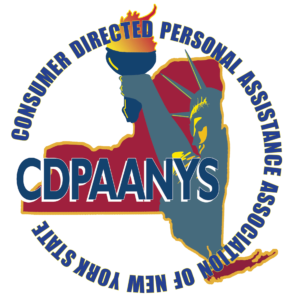ACTION ALERT via CDPAANYS:
THE DEADLINE TO SEND PUBLIC COMMENT IS TODAY — SEPTEMBER 14.

Public comment is now open on Governor Cuomo’s sweeping Medicaid eligibility changes, which appeared in the New York State Register on July 15, 2020.
The Department of Health (DOH) has published its draft regulations for the changes to personal care and consumer directed personal assistance (CDPA). The new regulations, which seek to implement parts of the budget, stem from the proposals of Governor Cuomo’s Medicaid Redesign Team II (MRT II). You can read the State Register entry here, beginning on numbered page 16. The Rule # is HLT-28-20-00019-P.
While there are some positives in these regulations, such as the shift in assessments from every six months to annually, these changes were designed to make it harder to access long-term supports and services (LTSS) and creates new levels of bureaucracy in seemingly arbitrary ways intended to limit or discourage people from seeking help to begin with.
Comments on the regulations are open for 60 days from when they were published, or Monday, September 14 at close of business.
Visit CDPAANYS VoterVoice Action Center to send your comments to the relevant person at the Department of Health. To help you understand what the regulations say, and provide talking points for comments, information has been included below. The comments are broken into several sections, based on eligibility changes, assessment process changes, the high-hour safety review, and immediate need.
Acronyms and abbreviations:
-
ADL – Activities of Daily Living
-
ALP – Assisted Living Program
-
CDPA – Consumer Directed Personal Assistance
-
CFEEC – Conflict Free Evaluation and Enrollment Center
-
DOH – Department of Health
-
IA – Independent Assessment
-
LDSS – Local District of Social Services (counties/HRA)
-
LTSS – Long-Term Supports and Services
-
MCO – Managed Care Organizations
-
MRT II – Medicaid Redesign Team II
Eligibility changes (Activities of daily living)
-
Individuals now need assistance with a minimum number of activities of daily living (ADLs) in order to qualify for personal care or CDPA. Eligibility varies based on type of disability. The ADL requirements are:
-
Assistance with supervision or physical maneuvering with two (2) or more ADLs is required for people with Alzheimer’s or dementia;
-
Assistance with physical maneuvering with three (3) or more ADLs is required for people with any other disability.
-
-
Activities of Daily Living (ADLs) are defined as: bathing, personal hygiene, dressing, walking, locomotion, transferring onto and off the toilet and toilet use, bed mobility, and eating.
-
Potential talking points:
-
Do you need assistance with fewer than the number of ADLs included here? What would that mean for you?
-
Why are the ADLs so specific? Do you need transferring assistance but use a catheter or some other tool to prevent the need for assistance with transferring on and off the toilet?
-
Assessment process changes
-
The assessment process has changed. The managed care organization (MCO) or Local District of Social Services (LDSS) assessments have been replaced by an Independent Assessment (IA). If needed, this will purportedly be combined with the initial assessment for MLTC eligibility, called the Conflict Free Evaluation and Enrollment Center (CFEEC).
-
For live-in cases (one person performing 24 hours worth of care, with an assumption they will receive eight (8) hours of sleep, at least five (5) consecutively, with three (3) one-hour breaks, the assessment will review whether the individual has suitable sleeping quarters for the worker.
-
The IA must make a determination as to whether other services could more efficiently provide services. This is not new. However, the regulations add Assisted Living Program (ALPs) and enriched housing to the list of services that must be considered. ALPs are basically nursing homes under a different name. Enriched housing is often an adult home.
-
The medical assessment will no longer be conducted by your physician or health care provider. There new regulations put in place an Independent Medical Assessment, to be performed by a qualified health care provider and signed off on by a physician. The physician may not have ever had interaction with the person being assessed. The physician or other individual conducting the Independent Medical Assessment may review the person’s previous medical records and consult with their health care provider(s). NOTE: This is a “may,” not a “shall.” The independent physician is not required to examine any other records in making his or her decision.
-
-
After the Independent Medical Assessment, the MCO or LDSS must review the Plan of Care and the IA. They may also do their own assessment. If an individual is to receive over 12 hours of services per day, on average, the MCO or LDSS must do an assessment.
-
The MCO or LDSS review of the IA includes:
-
Can services on the Plan of Care be provided?
-
Are the services medically necessary?
-
Are the facts on the assessment correct?
-
Can the individual maintain safety in the home?
-
Can the person be more appropriately and efficiently cared for with other tools or in another program?
-
Informal Supports
-
The regulations currently require that assessments include the provision of services through “informal supports” (unpaid family and friends). This is Federal law. However, the informal supports must be voluntarily offered by the individual who would provide them and voluntarily accepted by the person receiving services.
-
The proposed regulations maintain the need to determine the availability of informal supports. Each stage of the assessment process must look at individual supports; however, there is never notice that it must be voluntary from both parties.
-
The IA requires that informal supports must be acceptable to the individual receiving services. They do not speak to acceptability to the informal support.
-
The MCO or LDSS assessment or review of the assessment must look at the “…voluntary assistance available from informal caregivers…” This wording means the informal supports must be voluntary by the person providing services; but, no mention is made of the acceptability to the individual receiving services.
-
The denial notices state that appropriate wording is, “the client’s needs can be met by fully utilizing any available informal supports…” without acknowledging acceptability. This could potentially create appeal and fair hearing problems.
-
Alternative Settings or Services
-
Personal Care services (including CDPA), including 24 hour cases, will not be authorized if LDSS or the MCO determines that there are appropriate cost-effective alternatives.
-
This has always been a provision; however, the regulations add assisted living programs (typically nursing homes), enriched housing programs, and social adult day programs.
-
The expected frequency of nursing supervision will be taken into account. Those in traditional LHCSA personal care programs with significant nursing needs will face an institutionalization bias.
High hour cases- Safety Review
-
Before authorizing any case that averages 12 or more hours per day, the LDSS or MCO must submit the case to an Independent Clinical Review Panel so that a review can determine if an individual is safe in the community. The MCO or LDSS must take their recommendation into account when deciding whether or not to authorize the case.
-
This process is redundant. The process already includes an assessment of safety in the community in multiple places:
-
The IA assesses for safety in the community.
-
The LDSS/MCO review and assessment must consider whether the individual is safe to receive services in the community.
-
AFTER the Independent Clinical Review Panel submits their recommendation, the LDSS/MCO must again review whether or not the individual is safe in the community.
-
-
Twelve (12) hours is arbitrary. There is no clinical evidence pointing to the fact that someone is safe in the community at 11 hours, and potentially unsafe at 12 hours.
-
Safety is a relative term influenced by an individual doctor’s perceptions of people with disabilities and institutionalized ableism. Disabled people have significant experience being told that they are unsafe in the community, even as they are stable, and in some instances working.
Authorization process
-
Authorizations will now occur annually instead of biannually, unless otherwise required.
-
Authorization is annual, but not more than 12 months after the medical. This means those, particularly high hour cases, will not have the full period.
We encourage you to use specific talking points from above in your comments. Also consider these questions:
- How will cutting funding to Consumer Directed Personal Assistance affect you?
- Why is it dangerous to make it harder for people to get home care and CDPA?
- If you use 12 or more hours a day, why should you have to go through an extra medical review to prove you deserve to live at home?
- If you lose your CDPA services, what would that mean?
- Are you concerned that this will result in more people being sent to live in nursing homes?
View other organizations’ comments:
Downstate ADAPT: Toolkit & Comments
New York Legal Assistance Group
Southern Tier Independence Center




